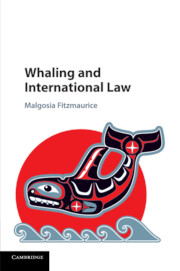Book contents
- Frontmatter
- Contents
- List of abbreviations
- Acknowledgements
- Table of cases
- Table of treaties, declarations and general comments
- Introduction
- 1 The history of whaling
- 2 The International Convention for the Regulation of Whaling
- 3 The International Whaling Commission
- 4 Cultural diversity
- 5 Environmental ethics, animal rights and the law
- 6 The IWC and its interaction with other organisations and conventions
- 7 Indigenous whaling
- 8 A case study of the protection of the narwhal whale
- Conclusion
- Appendix A Taxonomy of whales: a brief introduction on selected species
- Appendix B 1946 International Convention for the Regulation of Whaling
- Bibliography
- Index
2 - The International Convention for the Regulation of Whaling
Published online by Cambridge University Press: 05 December 2015
- Frontmatter
- Contents
- List of abbreviations
- Acknowledgements
- Table of cases
- Table of treaties, declarations and general comments
- Introduction
- 1 The history of whaling
- 2 The International Convention for the Regulation of Whaling
- 3 The International Whaling Commission
- 4 Cultural diversity
- 5 Environmental ethics, animal rights and the law
- 6 The IWC and its interaction with other organisations and conventions
- 7 Indigenous whaling
- 8 A case study of the protection of the narwhal whale
- Conclusion
- Appendix A Taxonomy of whales: a brief introduction on selected species
- Appendix B 1946 International Convention for the Regulation of Whaling
- Bibliography
- Index
Summary
Introduction
This chapter will deal with the main provisions of the International Convention for the Regulation of Whaling (ICRW) and provide critical analysis of recent developments regarding whaling within the legal framework of the ICRW. The diverse and critical views of scholars and practitioners will be presented in relation to the contemporary functioning of the Convention. The functioning of the ICRW will also be discussed from the historical perspective.
Some of the questions relating to the Convention are well known and have been the subject of numerous excellent publications. Nevertheless it is necessary to address them, not only in order fully to understand new developments, but also for reasons of completeness of the presentation. Issues such as aboriginal whaling will only be outlined in this chapter, and fully analysed in later chapters of the book.
The background to the 1946 ICRW
In 1946, when States gathered to regulate whaling, ‘they found themselves creating a new institution that was simultaneously very conservative and somehow radical’. Relying on using scientific expertise, the drafters of the Convention followed the more progressive tradition of the US in trying to reconcile the needs of industry with those of the conservation of whale stocks (as exemplified in the Preamble to the Convention by the reference to sustainable use). Acting United States Secretary of State Dean Acheson declared that whales were ‘the wards of the entire world’, a ‘common resource’ that must be conserved. He emphasised the need for cooperation in the use of the world's resources, arguing that the conference illustrated ‘increasing cooperation among the nations in the solution of international conservation problems’. Against this background, the Convention's objective appears to have been to serve as a means towards achieving such cooperation aimed at the conservation of whale stocks. The approach of the United Kingdom was not so much focused on conservation of the world's whales as on preservation of the whaling industry. This attitude was by and large dictated by the postwar conditions prevailing in the United Kingdom, namely, scarcity, hunger and want. It is also worth mentioning a remark made by Davidson, the United States Assistant Secretary of the US Interior Department, that science was the key to sustainable use.
- Type
- Chapter
- Information
- Whaling and International Law , pp. 29 - 56Publisher: Cambridge University PressPrint publication year: 2015
- 1
- Cited by



